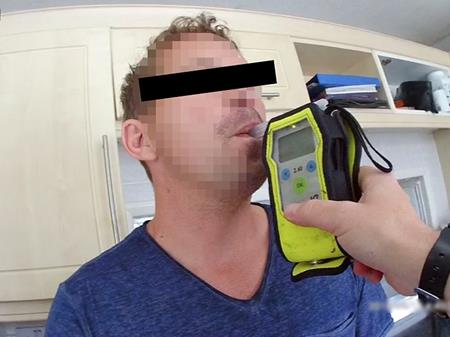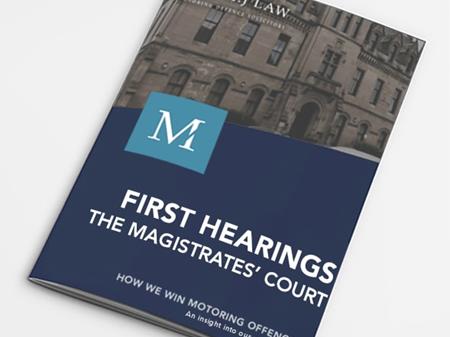Drink & Drug Driving Case Studies
Drink & Drug Driving Cases Dropped in 2024
A summary of recent cases
By Conor Johnstone - Specialist Motoring Defence Solicitor
How we win ‘unwinnable’ cases
Have you been suspected of drink or drug driving? You may think the police have the correct evidence. Think again.
After several years defending motorists accused of driving offences, I am constantly amazed at the poor evidence produced by the police and the Crown Prosecution Service (CPS).
Motorists often assume that the police must have the correct evidence. Indeed, I am often informed by CPS lawyers that the police always carry out all the procedures ‘by the book’ and therefore my clients have “no chance”. In fact, there is no ‘book’ to help the police. Even the forms used to guide the police through the procedure are detailed and complicated. Time and again I find mistakes made by the police. I thought it may interest the reader if I shared a summary of my last few cases. These are real cases, real events, real people. I have, however, changed the names of my clients. I have also withheld the police and CPS areas involved.
If you have any concerns with your own case, please contact me and I will be pleased to discuss all the options open to you. My initial telephone conference is always free of charge. My office number is 0151 422 8020. It does not matter where you live or where the alleged offence was committed because I represent clients throughout England and Wales.
Case 1 - Drink Driving
“A missing signature”
One of the first pieces of evidence that should be disclosed in a drink driving case is the lengthy document completed by the police at the police station. This document, known as the MGDDA form, contains the procedure adopted by the police when completing the breath test procedure. Additional documents, known as the MGDDB and MGDDC forms will need to be completed if urine or blood samples are requested. All these documents, many pages long, are designed as an ‘idiots guide’ to avoid the police making mistakes. Idiot proof. Really?
The end of the MGDDA form contains a section requiring a signature from the officer completing the breath procedure. In a recent case the signature was missing.
Another important signature can be found on the printout from the breathalyser machine. The printout gives the results of the breath test. It confirms that the machine was calibrated, provided two correct ‘tests’ and provided two correct samples. Importantly, it contains a clause and it must be signed. In two out of my last three cases I have been provided with an unsigned printout! See one of the printouts below - note the lack of signature.
Example breathalyser printout from an actual case (personal details obscured)

Case 2 - Drug Driving
“A missing page, a missing document”
When someone is charged with drug driving they will be sent to court. This means that they must attend court to enter a plea (guilty or not guilty). It is important that the motorist is provided with ‘advance disclosure’ of the evidence against them. The advance disclosure should contain, as a minimum, a case summary, the MGDD forms completed by the police and, more importantly, the SFR1 (Streamlined Forensic Toxicology Report).
Believe it or not, at least one CPS area is now providing a case summary without the SFR1 at the first hearing. In other words, motorists are expected to enter a plea without even seeing the evidence against them! The CPS expects almost all motorists just to plead guilty so, to save on costs, doesn’t bother to obtain the evidence. Nice.
I was at court two weeks ago representing a client charged with drug driving. It was a first hearing so I expected to obtain the advance disclosure when we got to court. After being handed what was described to me as the advance disclosure, I asked the CPS solicitor was she now going to drop the case against my client. Looking rather perplexed she asked why. “No SFR1. No MGDDB. No evidence”, I responded. She explained that most motorists don’t know what to look for and just plead guilty so there is no point wasting time and money in obtaining and checking the evidence.
Rather than just drop the case against my client she made a few frantic phone calls to get the ‘evidence’ faxed to the court for me to check. Interestingly, when the MGDDB form was faxed to the court it had a missing page and the SFR1 was incomplete. When the judge enquired as to the content of the missing page the CPS solicitor had to explain that it was the page where the police officer signs to state all is correct!
The CPS was ordered to hand over a full copy of the MGDDA form “forthwith”. The CPS indicted in court that it would be actioned that afternoon. Two weeks later and I’m still waiting. It looks like the case will not be proceeding.
Update: since writing this part the CPS has dropped this case. We have been awarded costs.
Case 3 - Drink & Drug Driving
“Sorry, I’m on holiday”
We all like our holidays. But when a case is set for trial the CPS should check the availability of the police officers involved in the case. The last thing the CPS want is the police officer failing to attend court to give evidence.
I recently had a serious drink-driving case. I was sure that the police and CPS would do everything possible to obtain a conviction. Numerous police officers were involved and, in total, fourteen witnesses gave statements against my client.
Despite the large number of people giving statements, one police officer in particular was key to the CPS case. This officer was responsible for obtaining samples from my client and completing the required documentation. I had a concern that he had not complied with the correct procedure and I requested his attendance at court in order that I would then be able to cross-examine him. Without this key witness the CPS case would collapse.
On the day of trial we were informed that the police officer had gone on holiday. Whether he had cleared off on holiday so as to avoid giving evidence, I don’t know. Perhaps he wasn’t even on holiday but just avoiding court. The CPS offered ‘no evidence’ and my client was found not guilty. We were also awarded costs.
Case 4 - Drink Driving (blood taken)
“A small matter of consent”
My client smashed his car, took out a lamp post, slid along the road and ended upside down, dead. He was revived at the scene by paramedics and doctors although he was in a very bad way. His skull was smashed and part of his brain was exposed. He was rushed to hospital.
He was suspected of driving over the legal limit and it was important for the police to follow the correct procedure when obtaining a blood sample. Obviously, my client was not in any fit state to give a roadside test. In this type of situation the police can, with correct authority, obtain a sample of blood. The police officer must obtain consent from both the motorist and the doctor in charge. The police may also need to instruct a separate doctor to obtain the blood sample.
All the information as to the procedure is documented on the MGDDC form. You can imagine my surprise when I read on the MGDDC form that my client had given his consent to the blood sample. Had I read this correctly? My client was unconscious, in hospital, skull smashed and suspected brain damage. Yet he was able to have a conversation with the police officer, understand what the officer was saying and give consent to a blood specimen.
I highlighted the problems with the procedure to the CPS. The CPS dropped the case and we obtained costs.
Case 5 - Drink Driving (Urine taken)
Bar codes and serial numbers. Why bother?
It all looked fairly normal. My client had been arrested for drink-driving and a urine sample had been taken. The sample was sent to the lab and tested. My client was charged with drink-driving.
At first sight everything appeared to be in order. However, delving a little deeper and cracks started to appear in the prosecution’s case.
I had concerns as to the labelling of the sample. Part A24 of the MGDDA had not been completed. This should contain details of how the specimen was marked. This is usually the bar code number associated with the sample kit and is unique to each kit. By obtaining the bar code it should then be possible to determine exactly which kit has been used if continuity or quality become issues at any point.
Part A24 of the MGDDA also failed to provide the serial number of the tamper evident bag. Neither did it state the time and date it was retained until by the police officer or what happened to the specimen. The actual section of the ‘completed’ MGDDA is provided below.

When I obtained the witness statement from the examiner at the lab (see below), it provided a case reference number, sample number and a secure bag reference number. But where did these reference numbers come from? How could anyone be sure they related to my client’s sample if the same reference numbers were not contained on the MGDDA form? The relevant sections from the actual witness statement from the examiner is contained below (personal details removed).

To make matters worse (for the prosecution), the witness statement from the examiner confirmed that the sample pot was not labelled with any information (see below).

It would appear that the police officer had provided reference numbers on the sample bag but had failed to reference the actual sample pot. In addition, he had failed to complete the MGDDA form correctly. The case was dropped by the CPS and we were awarded costs.
Case 7 - Drink Driving (Urine Taken)
One sample or two?
My client was slightly over the drink-drive limit according to the breathalyser machine. He was asked to provide a urine sample. The correct procedure is to provide two samples within one hour. In this case my client filled one sample pot. Stopped. Then filled a second sample pot. Two samples, right? Wrong.
The correct procedure is for the first sample to be obtained. The bladder is then emptied. More water is drank and, within the hour, a second sample is provided. Although my client had given ‘two’ samples, they were both from the same urine in the bladder. One sample.
If the analysed urine specimen was not a true and proper second specimen, but effectively a continuation of the first, then the urine concentration measured will be higher than the level of alcohol actually present in my client at that time.
Consider the actual section from the MGDDB form below. Would it be possible to provide a urine sample, empty ones bladder, take on more water and then go to the toilet again - all within 2 minutes? Apparently the police found no problem with this.
I was able to establish that, as two samples had not been correctly taken, the police had breached procedure. The CPS could not therefore rely on the urine sample and the case was dropped. We were awarded costs.

Case 8 - Drug Driving
“Not for samples”. Easy to read?
My client had a blood specimen taken. The specimen was correctly labelled and sealed. Prior to being sent off to the lab all specimens are placed in a dedicated forensic fridge at the police station. Fortunately, my client had a police officer that had some difficulty reading. He placed the sample in the fridge where the police kept their sandwiches. The fridge was clearly marked “Not for samples”! Case dropped.
Case 9 - Drink Driving (Breath)
“Don’t trust the paperwork”.
Hundreds of cases have been won over the years because the police failed to give the correct ‘statutory warning’. This warning must be given in all drink and drug driving cases. The purpose of the ‘statutory warning’ is to inform a suspect that he does not have to give a sample if he does not want to - it’s entirely optional.
This warning is written on the MGDDA form and, therefore, all the police officer has to do is read it out. Surely no room for mistakes, right?
In a recent case I obtained the MGDDA form from the police. It stated that the ‘statutory warning’ had been given to my client. He was charged with drink-driving based on a breath reading. This is the type of case the CPS may call “open and shut”.
In most cases I insist on obtaining the video or DVD from the breath/blood test procedure. In this case the police were reluctant to hand it over. Eventually, following a direction from the court, I obtained the DVD. To my amazement, the officer had skipped the warning. I wrote to the CPS and invited them to drop the case against my client. They agreed.
Case 10 - Drink Driving
“To provide a sample or not to provide a sample, that is the question”
If you are arrested for drink driving you will be asked to provide two specimens of breath for analysis. If you fail to provide two specimens then you could be charged with the offence of ‘failing to provide’. However, if you provide two specimens but there is, for example, a problem with the machine and two samples cannot be obtained, this is not your fault. It is not that you have ‘failed to provide’, only that the machine has failed to obtain. This is not your problem.
In this case my client provided two samples of breath as requested. The Camic Datamaster printout (from the breathalyser machine) stated that “mouth alcohol” was found in breath specimen number 2. This does occasionally happen, for various reasons, and was not the fault of my client. My client therefore gave two satisfactory breath specimens as required by law.
Unfortunately, the police officer assumed that the “unsatisfactory specimen 2” meant that my client had failed to provide a sample. The officer therefore completed the MGDDA form stating that my client had ‘failed to provide’. See the relevant section of the actual MGDDA form below.

This was a breach of procedure. This case was dropped by the CPS and we were awarded costs.
Case 11 - Drink Driving
“Sorry, but we’ve lost it”
In a recent case the CPS handed to me a breathalyser printout that had not been signed by the police officer. This immediately raised my concern. In addition, the page on the MGDDA form containing the signatures from the police was also missing.
At the first court hearing the CPS were directed by the court to obtain the correct documents. At the second hearing the CPS still didn’t have the correct documents because the police officer involved was not on duty and “had the file with him”. A further direction was made to supply the documents to the defence within 14 days.
Rather than receiving the documents I received a letter from the CPS. A copy of the relevant paragraph is copied below.

In court the CPS solicitor confirmed that a prosecution could not continue without the original MGDDA documents. The CPS dropped the case and we were awarded costs from Central Funds.
Worried about court? M.A.J. Law specialise in defending drink and drug driving cases. Drink driving defences can be complex and confusing, particularly when building in arguments surrounding mental health. You may not be aware that you have a full defence to the allegation against you. We would always advise speaking to a member of our team who can discuss your all your options in detail.






